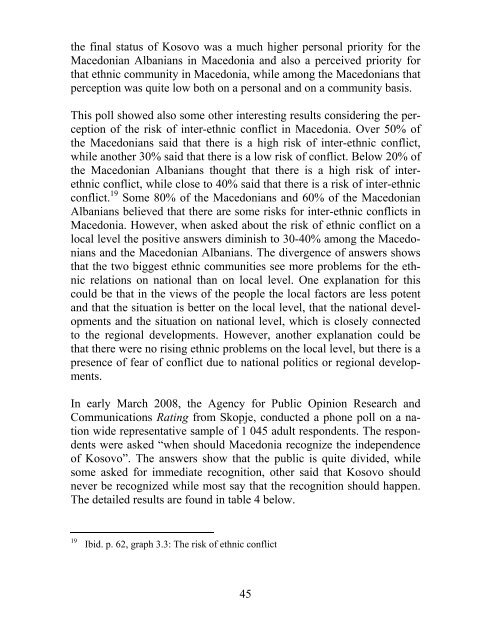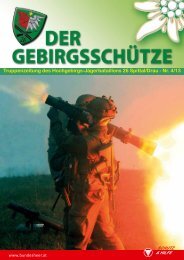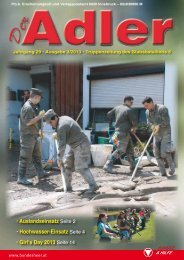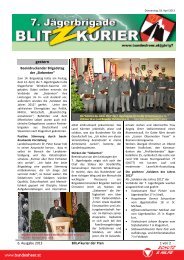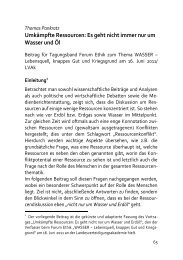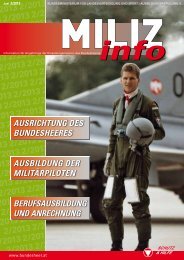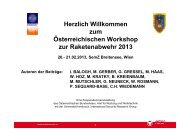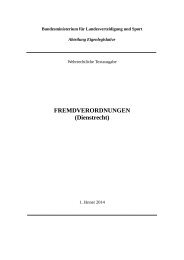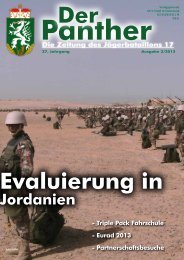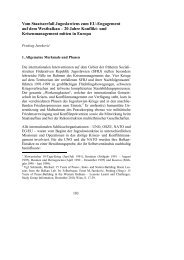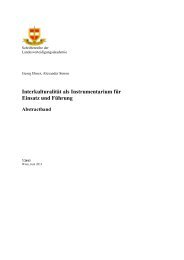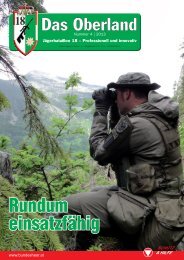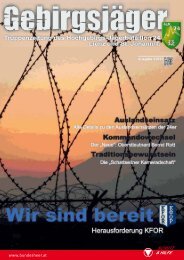Cutting or Tightening the Gordian Knot
Cutting or Tightening the Gordian Knot
Cutting or Tightening the Gordian Knot
Create successful ePaper yourself
Turn your PDF publications into a flip-book with our unique Google optimized e-Paper software.
<strong>the</strong> final status of Kosovo was a much higher personal pri<strong>or</strong>ity f<strong>or</strong> <strong>the</strong><br />
Macedonian Albanians in Macedonia and also a perceived pri<strong>or</strong>ity f<strong>or</strong><br />
that ethnic community in Macedonia, while among <strong>the</strong> Macedonians that<br />
perception was quite low both on a personal and on a community basis.<br />
This poll showed also some o<strong>the</strong>r interesting results considering <strong>the</strong> perception<br />
of <strong>the</strong> risk of inter-ethnic conflict in Macedonia. Over 50% of<br />
<strong>the</strong> Macedonians said that <strong>the</strong>re is a high risk of inter-ethnic conflict,<br />
while ano<strong>the</strong>r 30% said that <strong>the</strong>re is a low risk of conflict. Below 20% of<br />
<strong>the</strong> Macedonian Albanians thought that <strong>the</strong>re is a high risk of interethnic<br />
conflict, while close to 40% said that <strong>the</strong>re is a risk of inter-ethnic<br />
conflict. 19 Some 80% of <strong>the</strong> Macedonians and 60% of <strong>the</strong> Macedonian<br />
Albanians believed that <strong>the</strong>re are some risks f<strong>or</strong> inter-ethnic conflicts in<br />
Macedonia. However, when asked about <strong>the</strong> risk of ethnic conflict on a<br />
local level <strong>the</strong> positive answers diminish to 30-40% among <strong>the</strong> Macedonians<br />
and <strong>the</strong> Macedonian Albanians. The divergence of answers shows<br />
that <strong>the</strong> two biggest ethnic communities see m<strong>or</strong>e problems f<strong>or</strong> <strong>the</strong> ethnic<br />
relations on national than on local level. One explanation f<strong>or</strong> this<br />
could be that in <strong>the</strong> views of <strong>the</strong> people <strong>the</strong> local fact<strong>or</strong>s are less potent<br />
and that <strong>the</strong> situation is better on <strong>the</strong> local level, that <strong>the</strong> national developments<br />
and <strong>the</strong> situation on national level, which is closely connected<br />
to <strong>the</strong> regional developments. However, ano<strong>the</strong>r explanation could be<br />
that <strong>the</strong>re were no rising ethnic problems on <strong>the</strong> local level, but <strong>the</strong>re is a<br />
presence of fear of conflict due to national politics <strong>or</strong> regional developments.<br />
In early March 2008, <strong>the</strong> Agency f<strong>or</strong> Public Opinion Research and<br />
Communications Rating from Skopje, conducted a phone poll on a nation<br />
wide representative sample of 1 045 adult respondents. The respondents<br />
were asked “when should Macedonia recognize <strong>the</strong> independence<br />
of Kosovo”. The answers show that <strong>the</strong> public is quite divided, while<br />
some asked f<strong>or</strong> immediate recognition, o<strong>the</strong>r said that Kosovo should<br />
never be recognized while most say that <strong>the</strong> recognition should happen.<br />
The detailed results are found in table 4 below.<br />
19 Ibid. p. 62, graph 3.3: The risk of ethnic conflict<br />
45


